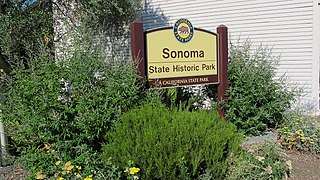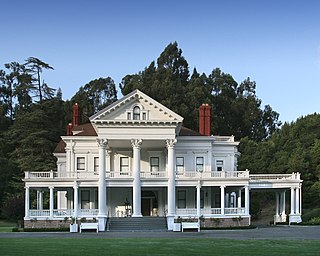
Sonoma County is located in the U.S. state of California. As of the 2020 United States Census, its population was 488,863. Its seat of government and largest city is Santa Rosa. It is to the north of Marin County and the south of Mendocino County. It is west of Napa and Lake Counties.

Petaluma is a city in Sonoma County, California, located in the North Bay region of the San Francisco Bay Area. Its population was 59,776 according to the 2020 census.

Santa Rosa is a city in and the county seat of Sonoma County, in the North Bay region of the Bay Area in California. Its population as of the 2020 census was 178,127. It is the largest city in California's Wine Country and Redwood Coast. It is the fifth most populous city in the Bay Area after San Jose, San Francisco, Oakland, and Fremont; and the 25th-most populous city in California.
Santa Rosa Junior College (SRJC) is a public community college in Santa Rosa, California with an additional campus in Petaluma and centers in surrounding Sonoma County. Santa Rosa Junior College was modeled as a feeder school for the University of California system. SRJC is operated by the Sonoma County Community College District.

The Center for Brooklyn History is a museum, library, and educational center founded in 1863 that preserves and encourages the study of Brooklyn's 400-year history. The center's Romanesque Revival building, located at Pierrepont and Clinton Streets in Brooklyn Heights, was designed by George B. Post and built in 1878-81, is a National Historic Landmark and part of New York City's Brooklyn Heights Historic District. The CBH houses materials relating to the history of Brooklyn and its people, and hosts exhibitions which draw over 9,000 members a year. In addition to general programming, the CBH serves over 70,000 public school students and teachers annually by providing exhibit tours, educational programs and curricula, and making its professional staff available for instruction and consultation.

Rancho Petaluma Adobe is a historic ranch house in Sonoma County, California. It was built from adobe bricks in 1836 by order of Mariano Guadalupe Vallejo. It was the largest privately owned adobe structure built in California and is the largest example of the Monterey Colonial style of architecture in the United States. A section of the former ranch has been preserved by the Petaluma Adobe State Historic Park and it is both a California Historic Landmark and a National Historic Landmark. The Rancho Petaluma Adobe State Historic Park is located on Adobe Road on the east side of the present-day town of Petaluma, California.

Sonoma State Historic Park is a California State Park located in the center of Sonoma, California. The park consists of six sites: the Mission San Francisco Solano, the Sonoma Barracks, the Blue Wing Inn, La Casa Grande, Lachryma Montis, and the Toscano Hotel.

The Dunsmuir House and Gardens is located in Oakland, California on a 50-acre (200,000 m2) site. The Dunsmuir House has a neoclassical-revival architectural style and is listed in the U.S. National Register of Historic Places. It is now used primarily for weddings, receptions, business gatherings and historical reenactment events.

Brainerd Jones was an American architect who designed and built most of the architecturally significant buildings in Petaluma, California.

The Carnegie Free Library of Beaver Falls is a historic Carnegie library in the city of Beaver Falls, Pennsylvania, United States. Erected as Beaver County's first library building, it was financed by Andrew Carnegie and designed by a leading Pittsburgh architect in grand architectural style that helped to redefine the image of the typical Carnegie library. Numerous community organizations have used its space, which remains in continued use as a library, and it has been named a historic site.

The Petaluma and Santa Rosa Railway Power House is a historic building in Sebastopol, California, U.S., built to serve the Petaluma and Santa Rosa Railroad, an electric interurban railway of Sonoma County. It is also known as the Hogan Building and the P&SR Substation. It was listed on the National Register of Historic Places in 1991.

The Vallejo Estate is a historic house in Sonoma, California, one of the six sites that comprises the Sonoma State Historic Park. The estate was owned by General Mariano Guadalupe Vallejo, a Californio military leader and landowner. Vallejo began buying the acreage for the house after returning from the California constitutional convention in Monterey in 1849, and resided in the house from 1852 until his death in 1890. He named the house Lachryma Montis, a rough Latin translation of Chiucuyem – the Native American name for the free-flowing spring on the property.

The Carnegie Art Museum is a public art museum owned by the City of Oxnard, California in the building originally occupied by the Oxnard Public Library. The Neo-Classical building, located adjacent to Oxnard's Plaza Park, opened in 1907 as the Oxnard Public Library and was converted into an art museum in 1986. In July 1971, it became the first building in Ventura County and the first Carnegie library in California to be listed on the National Register of Historic Places.

The Woodland Public Library is the oldest, and one of the last functioning Carnegie-funded libraries in California. It is on the National Register of Historic Places and is a contributing property of the Downtown Woodland Historic District.

The Doris Foley Library for Historical Research is a reference and research library in Nevada City, in Nevada County, California. Built in 1907, the Romanesque Revival style building is currently a branch of the Nevada County Library System.

The Sonoma County Library is a medium-sized public library system that serves the nine cities and unincorporated areas of Sonoma County, California. The library system is a joint powers authority, with administration located at the Administrative Offices, 6135 State Farm Dr, Rohnert Park, CA 94928.

The Smith County Historical Society, housed in the Carnegie Library, is located at 125 S. College Street in the city of Tyler, Smith County, Texas, U.S. It was built in 1904 as the Carnegie Public Library, and added to the National Register of Historic Places listings in Smith County, Texas in 1979. When Tyler built a new public library, the Carnegie building was leased to the Smith County Historical Society and continues to operate as a museum and archives.

The Carnegie Library at Livermore, California, opened in 1911 and continued in use as a library until 1966. It now hosts a historical museum and art gallery. The building was designed by William H. Weeks in the Greek Revival style and is included on the National Register of Historic Places. A weekly farmers' market takes place in the surrounding park.

The Healdsburg Carnegie Library, which was also known as the Healdsburg Public Library and is now the Healdsburg Museum, is a Carnegie library built in 1911 in Healdsburg, California. It was listed on the National Register of Historic Places in 1988,.




















